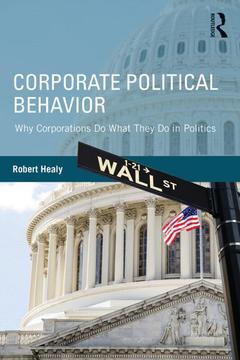Description
Corporate Political Behavior
Why Corporations Do What They Do in Politics
Author: Healy Robert
Language: English
Subjects for Corporate Political Behavior:
Keywords
business-government relations; corporate political behavior; corporate political culture; political capital; campaign financing; market; political management; Internal corporate; political positioning; political influence; money and politics; Ta Ge; Pr Om; Business Industry Political Action Committee; Corporate Political; Competitive Political Advantage; Corporate Political Action; Nonmarket World; Corporate Political Leadership; Federal Reserve; Political Action Committee; PAC; PAC Manager; Internal Corporate World; Political Action Choices; Political Reputation; National Political Party Conventions; Local People Meters; Super PACs; Political Giving; Ceo Commitment; Political Astuteness; PAC Contribution; Political Clout
Approximative price 64.97 €
In Print (Delivery period: 14 days).
Add to cartPublication date: 09-2014
Support: Print on demand
Approximative price 160.25 €
In Print (Delivery period: 14 days).
Add to cartPublication date: 06-2014
Support: Print on demand
Description
/li>Contents
/li>Biography
/li>
Corporate Political Behavior centers on why corporations do what they do in politics. The text draws upon insights from the author?s forty years of government and political experience?insights placed within an operating framework grounded in the political science and strategic issue management disciplines.
Robert Healy argues that corporate political behavior results from the interplay of behavioral drivers?commercial objectives, competitive political advantage, corporate political culture and leadership?and behavioral enablers?political capital, corporate political reputation, corporate campaign financing, and corporate political clout. This interplay all functions within a three-world environment: market, non-market, and internal corporate. The book examines how these factors structure a firm?s political positioning, its business-political strategies, and its political behavior as it seeks to attain its marketplace goals. The text features in-chapter side bars? events, or circumstances or political happenings of which the author either knew or participated?along with longer mini-cases in which the author also participated or was consulted. Each chapter concludes with a summary and takeaway points.
Corporate Political Behavior will be applicable to courses in political science and in business school courses on strategic issue management, policy construction, corporate agency and corporate strategy, as well as of interest to corporations and practitioners.
Introduction: Explaining Corporate Political Behavior—three platforms. 1. Conditioner: The Governed Market System and its Boundaries. 2. Conditioner: Managers, Shareholders, and the Implicit Bargain. 3. Conditioner: Three Worlds and Three Firms. 4. Driver: Commercial Objectives—goals and politics. 5. Driver: Competitive Political Advantage—getting the corporate edge. 6. Driver: Corporate Political Culture—the way we practice politics (or don’t). 7. Driver: Corporate Political Leadership—get ‘er’done. 8. Enabler: Political Capital—corporate accounting of a different kind. 9. Enabler: Political Reputation of a Firm—the right "buzz". 10. Enabler: Political Money—it’s about the cash.11. Enabler: Corporate Political Clout—illusive but real. 12. Political Positioning (1)—the first four keys: policy, elections, aspirations, globalism. 13. Political Positioning (2)—the fifth key: Mobilization—political, issue, and advocacy management. 14. Political Positioning (3)—strategies, objectives, and tactics. 15. Conclusion—the enigma of corporate political behavior.
Robert Healy is a full-time professional lobbyist and part-time academic. He holds a Ph.D. in Political Science from the University of Pittsburgh. Healy is an Adjunct Professor of Political Science at American University where for the last 9 years he has taught a scheduled class on Corporations and Political Behavior—an upper-level undergraduate and graduate course. Healy also taught a Strategic Issue Management/Government Relations course in the MBA program at George Washington University’s School of Business.




